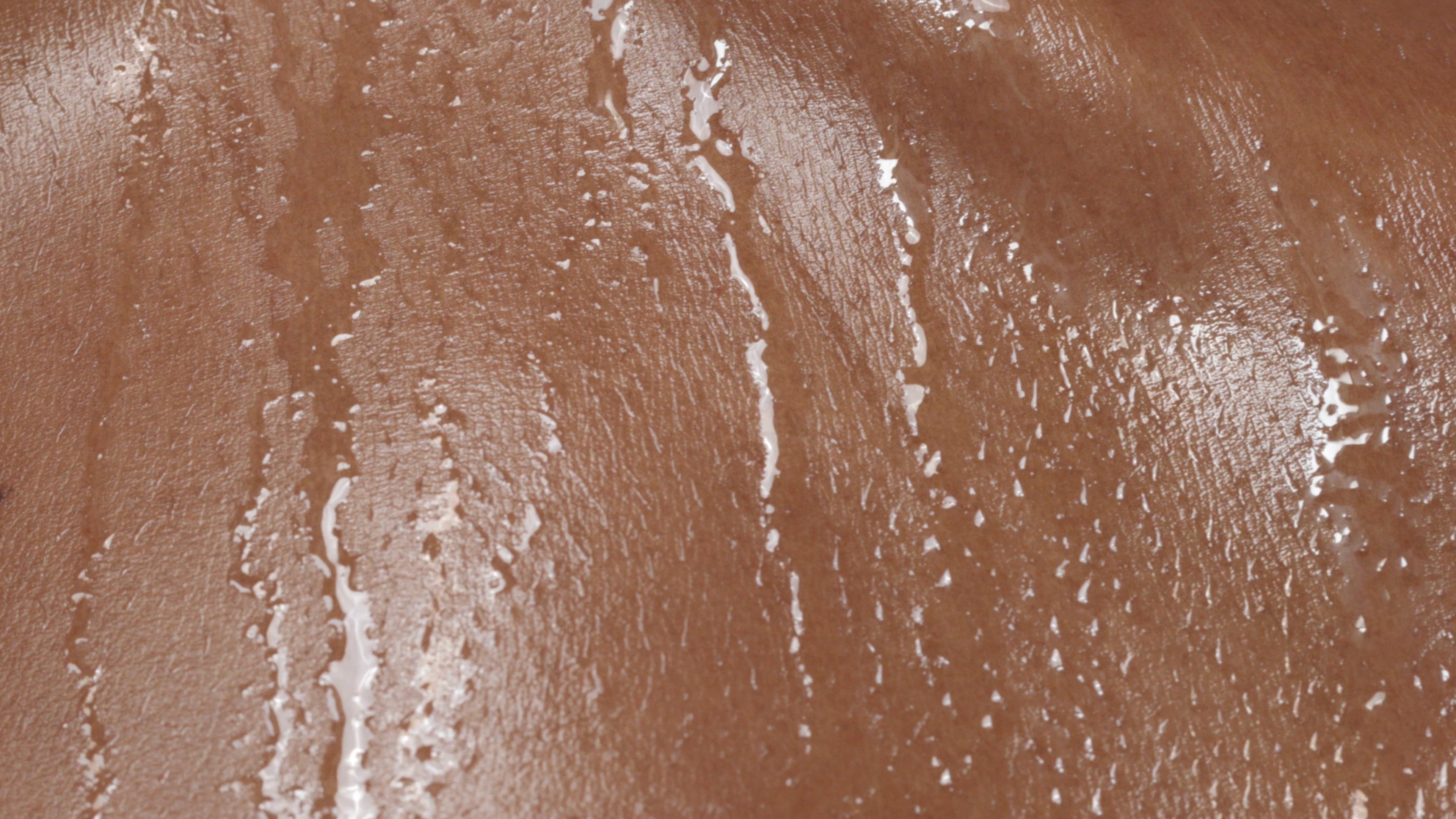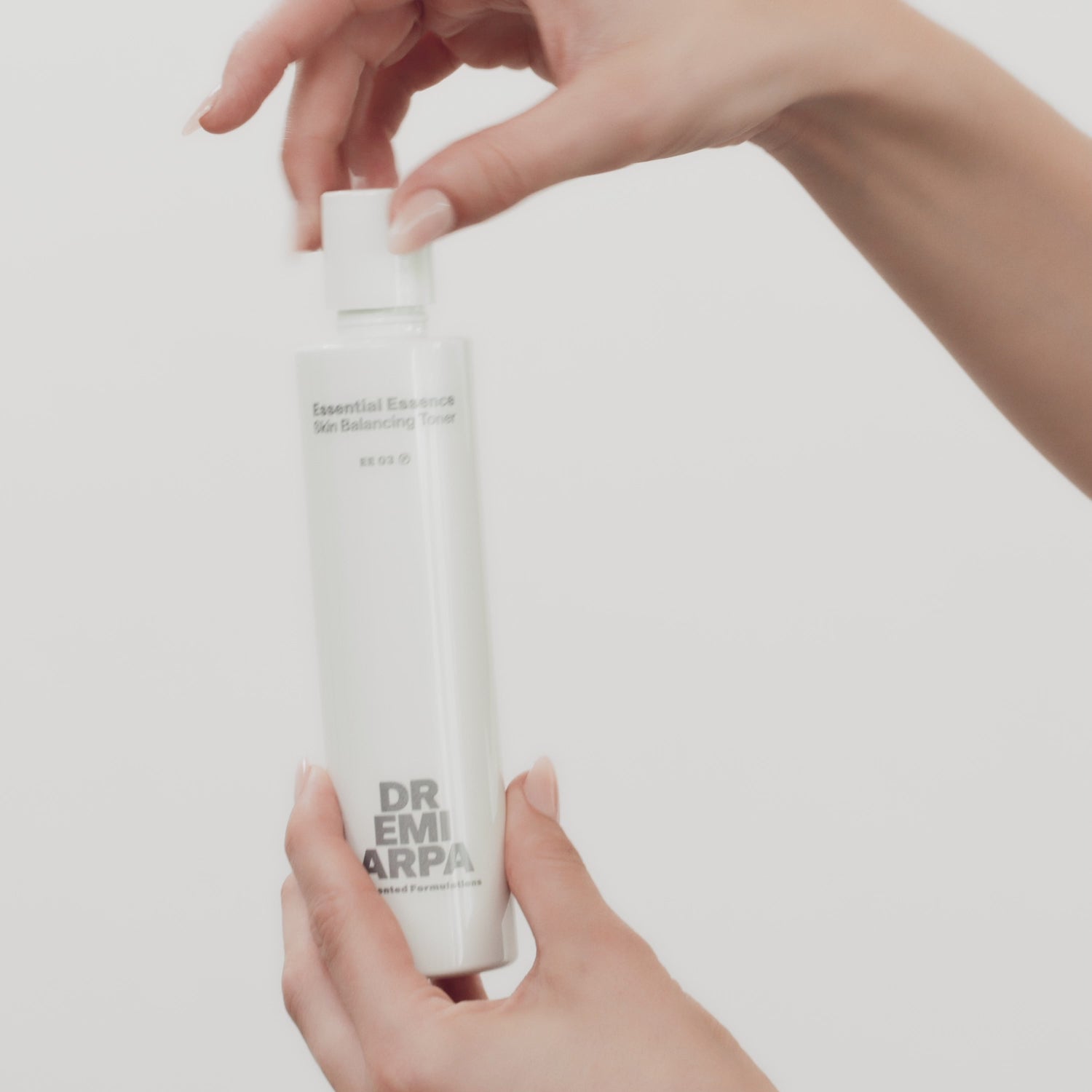WARUM DAS HAUTMIKROBIOM SO WICHTIG IST

WARUM DAS HAUTMIKROBIOM SO WICHTIG IST
Das Hautmikrobiom spielt eine entscheidende Rolle für die Hautgesundheit. Die Mikroorganismen auf unserer Haut, zu denen Bakterien, Pilze und Viren gehören, leben in einer symbiotischen Beziehung mit uns und beeinflussen unser Wohlbefinden.
Du suchst Hautpflege-Produkte zur Unterstützung deines Hautmikrobioms? Hier geht’s direkt zum Shop:
DIE BEDEUTUNG DES HAUTMIKROBIOMS FÜR DIE HAUTGESUNDHEIT
Was ist das Hautmikrobiom?
Das Hautmikrobiom ist eine vielfältige Mikrobenwelt, die unsere Hautoberfläche besiedelt. Diese Mikroorganismen sind unerlässlich für den Schutz der Haut vor pathogenen Keimen und tragen zur Immunregulation bei. Das Hautmikrobiom variiert je nach genetischen Faktoren, Alter, Geschlecht, Hautareal, Lebensstil und Umweltbedingungen.
Warum ist das Hautmikrobiom wichtig?
Das Hautmikrobiom ist ein wesentlicher Schutzmechanismus der Haut. Es konkurriert mit pathogenen Mikroorganismen um Nährstoffe und Raum, wodurch Infektionen verhindert werden. Zudem hilft das Hautmikrobiom bei der Regulation des Immunsystems, was übermäßige Entzündungen vermeiden kann.
1. Schutz vor Pathogenen
Ein gesundes Hautmikrobiom wirkt als Barriere gegen schädliche Mikroorganismen und schützt die Haut vor äußeren Einflüssen. Die Hautflora, also die Gesamtheit der auf der Haut lebenden Mikroorganismen, spielt hierbei eine zentrale Rolle.
2. Einfluss auf die Hautalterung
Das Hautmikrobiom beeinflusst auch den Alterungsprozess der Haut. Mit zunehmendem Alter verändert sich die Zusammensetzung des Mikrobioms, was die Haut anfälliger für Krankheiten machen kann. Probiotika und Präbiotika für die Haut können helfen, diese Veränderungen zu mildern und die Hautgesundheit zu fördern.
3. Mikrobiom und Hautpflege
Die Pflege des Hautmikrobioms ist entscheidend für die Aufrechterhaltung einer gesunde Hautbarriere. Faktoren wie Alter, Klima, hormonelle Schwankungen (z.B. während der Pubertät und der Menopause), Hygienegewohnheiten und der Einsatz von Antibiotika können die Zusammensetzung des Hautmikrobioms beeinflussen und zu einer Dysbiose führen. Eine Dysbiose, also ein Ungleichgewicht der Hautbakterien, kann verschiedene Hauterkrankungen begünstigen. Effektive Mikroorganismen in der Hautpflege können dazu beitragen, das Hautmikrobiom aufzubauen und zu stärken.
INNOVATIVE ANSÄTZE IN DER HAUTPFLEGE
Das Wissen über das Hautmikrobiom hat zu neuen Ansätzen in der Hautpflege geführt. Fermentierte Inhaltsstoffe, wie Postbiotika, sowie Präbiotika können das Hautmikrobiom unterstützen und die Hautgesundheit fördern. Bislang gibt es nur wenige Kosmetikunternehmen, insbesondere in Deutschland und der EU, die fermentierte Inhaltsstoffe in ihren Produkten verwenden. Und wenn sie diese verwenden, dann meist nur in geringer Konzentration. Diese Tatsache sowie neueste wissenschaftliche Erkenntnisse haben uns bei Dr. Emi Arpa Skin dazu veranlasst, innovative Produkte zu entwickeln, die die mikrobielle Vielfalt der Haut erhalten und fördern. Deshalb enthalten alle Produkte von Dr. Emi Arpa Skin fermentierte Inhaltsstoffe. Die Hautpflegeprodukte enthalten sogar mindestens 10% Prä- und Postbiotika.
Unser Star für das Hautmikrobiom ist der Essential Essence Skin Balancing Toner mit 11 % Prä- und Postbiotika, die das Hautmikrobiom unterstützen und entzündungshemmend wirken. Unser Essential Essence Toner enthält die höchste Konzentration an Fermenten in der DR. EMI ARPA Skincare! Die sorgfältig ausgesuchten Fermente findest du in der Inhaltsstoffliste als Bifida Ferment Lysate, Lactobacillus Ferment Lysate, Lactococcus Ferment Lysate und Bacillus Ferment.








Skin Balancing Toner
11 % Prä- und Postbiotika unterstützen das Hautmikrobiom, wirken entzündungshemmend
13 Aminosäuren stärken die Hautbarriere und spenden Feuchtigkeit.
Allantoin fördert die Hautregeneration und wirkt stark antioxidativ.
Plus: Ein Peptid das intensiv Feuchtigkeit spendet und die natürliche Exfoliation der Haut fördert
Von Dermatologin Dr. Emi Arpa entwickelt
Ganz toller Toner, der super schöne und gepflegte Haut hinterlässt und vor allem hilft, meine Haut wieder in Balance zu bringen.
Nach jeder Anwendung fühlt es sich an, als würde meine Haut sich bei mir bedanken, dass ich endlich verstanden habe, was sie braucht.
Erfrischend, beruhigend und ich habe das Gefühl, die nachfolgenden Produkte werden besser aufgenommen.
KRANKHEITEN DURCH EIN GESTÖRTES HAUTMIKROBIOM
Ein Ungleichgewicht im Hautmikrobiom, auch Dysbiose genannt, kann zu verschiedenen Hautkrankheiten führen:
- Akne
Cutibacterium acnes kann sowohl schützend als auch schädlich wirken. Bei Dysbiose trägt es zur Entwicklung von Akne vulgaris bei. Akne tritt häufig während der Pubertät auf, wenn die hormonell gesteuerte Talgproduktion ansteigt und das Hautmikrobiom substantiellen Änderungen unterliegt. C. acnes spaltet Bestandteile des Hauttalgs zur Energiegewinnung, doch bei Akne gerät dieser Prozess aus dem Gleichgewicht, was zur Ansammlung entzündungsfördernder Stoffe führt. Diese Stoffe locken weiße Blutkörperchen an, deren Absterben zu typischen eitergefüllten Pusteln führt.
- Atopische Dermatitis
Atopische Dermatitis ist eine entzündliche Hauterkrankung, die mit einer reduzierten Diversität des Hautmikrobioms und einer Überbesiedlung mit Staphylococcus aureus einhergeht.
- Rosazea
Rosazea ist durch Rötungen und Entzündungen im Gesicht gekennzeichnet. Eine Dysbiose des Hautmikrobioms, insbesondere eine Zunahme bestimmter Bakterien und Milben, wird mit Rosazea in Verbindung gebracht. Eine höhere Dichte an Toll-like-Rezeptoren-2 (TLR-2) aktiviert das Immunsystem und führt zu Entzündungsprozessen. Zudem spielen einige Darmbakterien eine Rolle bei der Rosazea, und die Reduzierung dieser Bakterien kann die Symptome lindern. Diese Zusammenhänge werden als Darm-Haut-Achse bezeichnet.
WIRKSTOFFE ZUR UNTERSTÜTZUNG DES HAUTMIKROBIOMS
Bestimmte Inhaltsstoffe in Hautpflegeprodukten können das Hautmikrobiom gezielt unterstützen und stärken:
- Bifida Ferment Lysate und Lactobacillus Ferment Lysate: Diese Postbiotika verbessern sichtbare Hautrötungen und stärken die Hautbarriere, indem sie die Bildung von Proteinen fördern, die zur Stabilisierung der Zellverbände in der Haut beitragen.
- Lactococcus Ferment Lysate: Fördert die Hauterneuerung und beschleunigt die Wiederherstellung der Hautbarriere. Es verbessert die Funktion der Hautbarriere, optimiert die Hautfeuchtigkeit und reguliert den pH-Wert der Haut, was den lipidbildenden Enzymen der Haut ermöglicht, nahe an ihrem pH-Optimum zu arbeiten, und so zu einer optimierten Hautbarrierebildung führt.
- Bacillus Ferment kann zusätzlich wundheilungsfördernde Eigenschaften aufweisen.
- Alpha-Glucan Oligosaccharide und Inulin: Diese Präbiotika dienen als Nahrungsquelle für Bakterien und unterstützen gemeinsam die kommensale Hautflora. Sie stärken die Hautbarriere, indem sie das Wachstum unerwünschter Bakterien hemmen, und können Hautsymptome wie Trockenheit und Juckreiz lindern.
KEY TAKEAWAYS
Das Hautmikrobiom spielt eine zentrale Rolle für die Hautgesundheit, indem es als Schutzbarriere gegen schädliche Mikroorganismen dient und das Immunsystem reguliert. Ein gesundes Hautmikrobiom kann Hautalterungsprozesse verlangsamen und das Risiko von Hautkrankheiten wie Akne, atopischer Dermatitis und Rosazea reduzieren. Dysbiosen, also Ungleichgewichte im Mikrobiom, können hingegen verschiedene Hautprobleme verursachen.
Die Pflege des Hautmikrobioms durch geeignete Hautpflegeprodukte ist daher essenziell. Innovative Produkte mit fermentierten Inhaltsstoffen (Postbiotika) und Präbiotika können das Mikrobiom unterstützen und die Hautbarriere stärken. Obwohl bisher nur wenige Kosmetikunternehmen in Deutschland (Europa) solche Inhaltsstoffe in ausreichender Konzentration verwenden, hat sich Dr. Emi Arpa Skin dieser Aufgabe verschrieben. Alle unsere Hautpflegeprodukte enthalten fermentierte Inhaltsstoffe, um die mikrobielle Vielfalt der Haut zu fördern und zu erhalten.
Der Einsatz solcher Inhaltsstoffe ist ein wichtiger Schritt in der modernen Hautpflege und zeigt, wie wissenschaftliche Erkenntnisse zu praktischen Lösungen führen können, die das Wohlbefinden und die Gesundheit der Haut verbessern. Entdecke die Vorteile einer gezielten Pflege des Hautmikrobioms und erfahre, wie unsere Produkte zur Erhaltung und Förderung deiner Hautgesundheit beitragen können.
FAQ zum Hautmikrobiom
Die Hautflora besteht aus einer Vielzahl von Mikroorganismen, einschließlich Bakterien, Pilzen, Viren und Archaeen. Diese Mikroorganismen leben in Symbiose mit der menschlichen Haut und erfüllen wichtige Funktionen für die Hautgesundheit, wie den Schutz vor pathogenen Keimen und die Unterstützung des Immunsystems.
Die Zusammensetzung der Hautflora variiert je nach Körperregion und wird von Faktoren wie Alter, Geschlecht, genetischer Veranlagung, Lebensstil und Umweltbedingungen beeinflusst. Hauptsächlich besteht die Hautflora aus Bakterien wie Staphylococcus, Corynebacterium und Cutibacterium acnes.
Auf der menschlichen Haut befinden sich zahlreiche Bakterien, darunter Staphylococcus epidermidis, Cutibacterium acnes und Corynebacterium. Diese Bakterien spielen eine wichtige Rolle bei der Aufrechterhaltung des Säureschutzmantels und des allgemeinen Hautgesundheitszustandes.
Die Haut schützt den Körper durch ihre Barrierefunktion, die den Eintritt von Krankheitserregern und schädlichen Substanzen verhindert. Der Säureschutzmantel und die Hautflora tragen zur Abwehr von Mikroorganismen bei, während die physikalische Barriere der Haut vor mechanischen Verletzungen und UV-Strahlung schützt.
Der Säureschutzmantel der Haut ist eine dünne, leicht saure Schicht auf der Hautoberfläche, die aus Schweiß, Talg und abgestorbenen Hautzellen besteht. Er hat einen leicht sauren pH-Wert von etwa 4,5 bis 5,5 und schützt die Haut vor schädlichen Mikroorganismen und Umwelteinflüssen.
Der normale pH-Wert der menschlichen Haut liegt zwischen 4,5 und 5,5. Dieser leicht saure pH-Wert hilft, die Hautbarriere zu erhalten und das Wachstum schädlicher Bakterien zu hemmen.
Die Haut erfüllt zahlreiche wichtige Funktionen, darunter:
- Schutzfunktion: Sie schützt vor physikalischen, chemischen und mikrobiellen Einflüssen.
- Temperaturregulation: Sie hilft, die Körpertemperatur zu regulieren.- Sinnesfunktion: Sie enthält Rezeptoren für Druck, Temperatur und Schmerz.
- Stoffwechsel: Sie beteiligt sich an der Synthese von Vitamin D.
- Immunabwehr: Sie bildet eine Barriere gegen pathogene Mikroorganismen.
Der Darm und die Haut stehen in enger Verbindung, bekannt als Darm-Haut-Achse. Ein gesundes Darmmikrobiom kann die Hautgesundheit positiv beeinflussen, während eine Dysbiose im Darm zu Hautproblemen wie Akne, Rosazea und Ekzemen führen kann. Probiotika und präbiotische Ernährung können sowohl die Darm- als auch die Hautgesundheit fördern.
Ja, eine Mikrobiomanalyse kann sinnvoll sein, um die Zusammensetzung der Hautflora zu verstehen und eventuelle Dysbiosen zu erkennen. Sie bietet detaillierte Einblicke in die Mikroorganismen, die auf der Haut leben, und kann helfen, personalisierte Hautpflegeprodukte zu entwickeln, die das Hautmikrobiom stärken.
Ácsová A., Hojerová J., Martiniaková S. (2022). Efficacy of postbiotics against free radicals and UV radiation. Chem. Pap. 76, 2357–2364.
Al-Ghazzewi F. H., Tester R. F. (2014). Impact of prebiotics and probiotics on skin health. Beneficial microbes, 5(2), 99–107.
Antão H.S., Passerini E., Guimarães J.P., Saldanha J., Coelho J.D., Fortunato M. (2017). Efficacy, tolerability and acceptability of topical regimens containing the prebiotic Biolin in children suffering from atopic dermatitis. Eur. J. Pediat. Dermatol., 27(2), 102-12.
Boyajian JL, Ghebretatios M, Schaly S, Islam P, Prakash S. (2021). Microbiome and Human Aging: Probiotic and Prebiotic Potentials in Longevity, Skin Health and Cellular Senescence. Nutrients, 13(12).
Byrd AL, Belkaid Y, Segre JA. (2018). The human skin microbiome. Nat Rev Microbiol, 16(3), 143-55.
Dréno B, Pécastaings S, Corvec S, Veraldi S, Khammari A, Roques C. (2018). Cutibacterium acnes (Propionibacterium acnes) and acne vulgaris: a brief look at the latest updates. J Eur Acad Dermatol Venereol., 32 (2), 5-14.
Grice EA. (2014). The skin microbiome: potential for novel diagnostic and therapeutic approaches to cutaneous disease. Seminars in cutaneous medicine and surgery, 33(2), 98–103.
Guéniche A., Bastien P., Ovigne J. M., Kermici M., Courchay G., Chevalier V., Breton L., Castiel-Higounenc I. (2010). Bifidobacterium longum lysate, a new ingredient for reactive skin. Experimental dermatology, 19(8), 1–8.
Han JH, Kim HS. (2024). Skin Deep: The Potential of Microbiome Cosmetics. J Microbiol., 62(3), 181-199.
Hausmann C., Hertz-Kleptow D., Zoschke C., Wanjiku B., Wentzien-Odenthal A., Kerscher M., Schäfer-Korting M. (2019). Reconstructed Human Epidermis Predicts Barrier-Improving Effects of Lactococcus lactis Emulsion in Humans. Skin Pharmacology and Physiology, 32(2), 72–80.
Kong HH, Oh J, Deming C, Conlan S, Grice EA, Beatson MA, Nomicos E, Polley EC, Komarow HD; NISC Comparative Sequence Program; Murray PR, Turner ML, Segre JA. (2012). Temporal shifts in the skin microbiome associated with disease flares and treatment in children with atopic dermatitis. Genome Res., 22(5), 850–859.
Krutmann J. (2009). Pre- and probiotics for human skin. Journal of dermatological science, 54(1), 1–5.
Murillo N, Raoult D. (2013). Skin microbiota: overview and role in the skin diseases acne vulgaris and rosacea. Future Microbiol., 8(2), 209-222.
Nizioł-Łukaszewska Z.,Bujak T., Wasilewski T., Szmuc E. (2019). Inulin as an effectiveness and safe ingredient in cosmetics. Polish Journal of Chemical Technology, 21(1), 44-49.
Pérez-Rivero C, López-Gómez JP (2023). Unlocking the Potential of Fermentation in Cosmetics: A Review. Fermentation, 9(5), 463.
Picardo M, Ottaviani M. (2014). Skin microbiome and skin disease: the example of rosacea. J Clin Gastroenterol., 48(1), 85-86.
Szöllősi A. G., Gueniche, A., Jammayrac, O., Szabó-Papp, J., Blanchard, C., Vasas, N., Andrási, M., Juhász, I., Breton, L., & Bíró, T. (2017). Bifidobacterium longum extract exerts pro-differentiating effects on human epidermal keratinocytes, in vitro. Experimental dermatology, 26(1), 92–94.
Tripodo G., Mandracchia D. (2019). Inulin as a multifaceted (active) substance and its chemical functionalization: From plant extraction to applications in pharmacy, cosmetics and food. Eur J Pharm Biopharm., 141, 21–36.
Vinderola G, Sanders ME, Salminen S. (2022). The Concept of Postbiotics. Foods, 11(8), 1077.
Wang R., Yan S., Ma X., Zhao J., Han Y., Pan Y., Zhao H. (2023). The pivotal role of Bifida Ferment Lysate on reinforcing the skin barrier function and maintaining homeostasis of skin defenses in vitro. Journal of cosmetic dermatology.

















